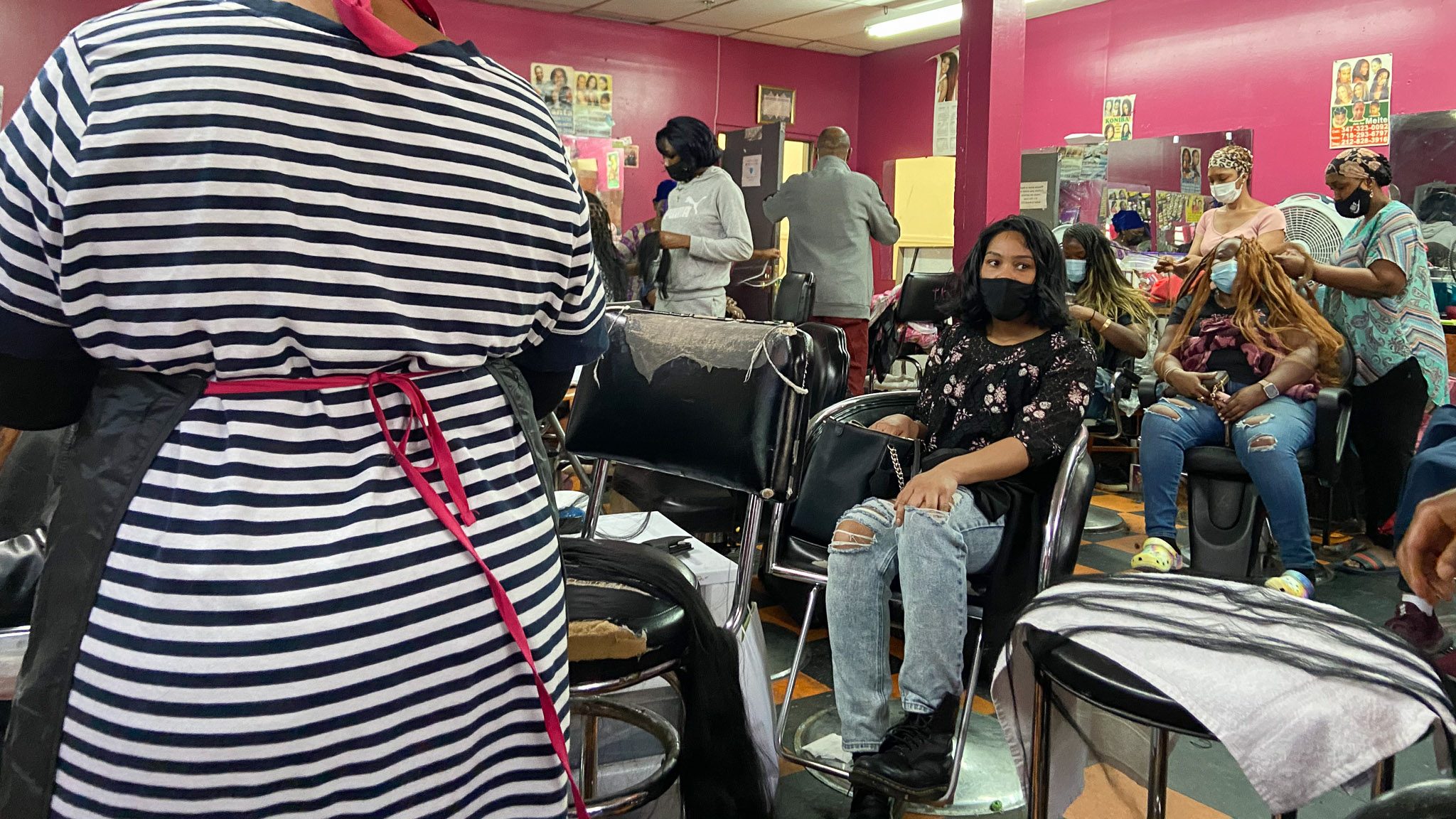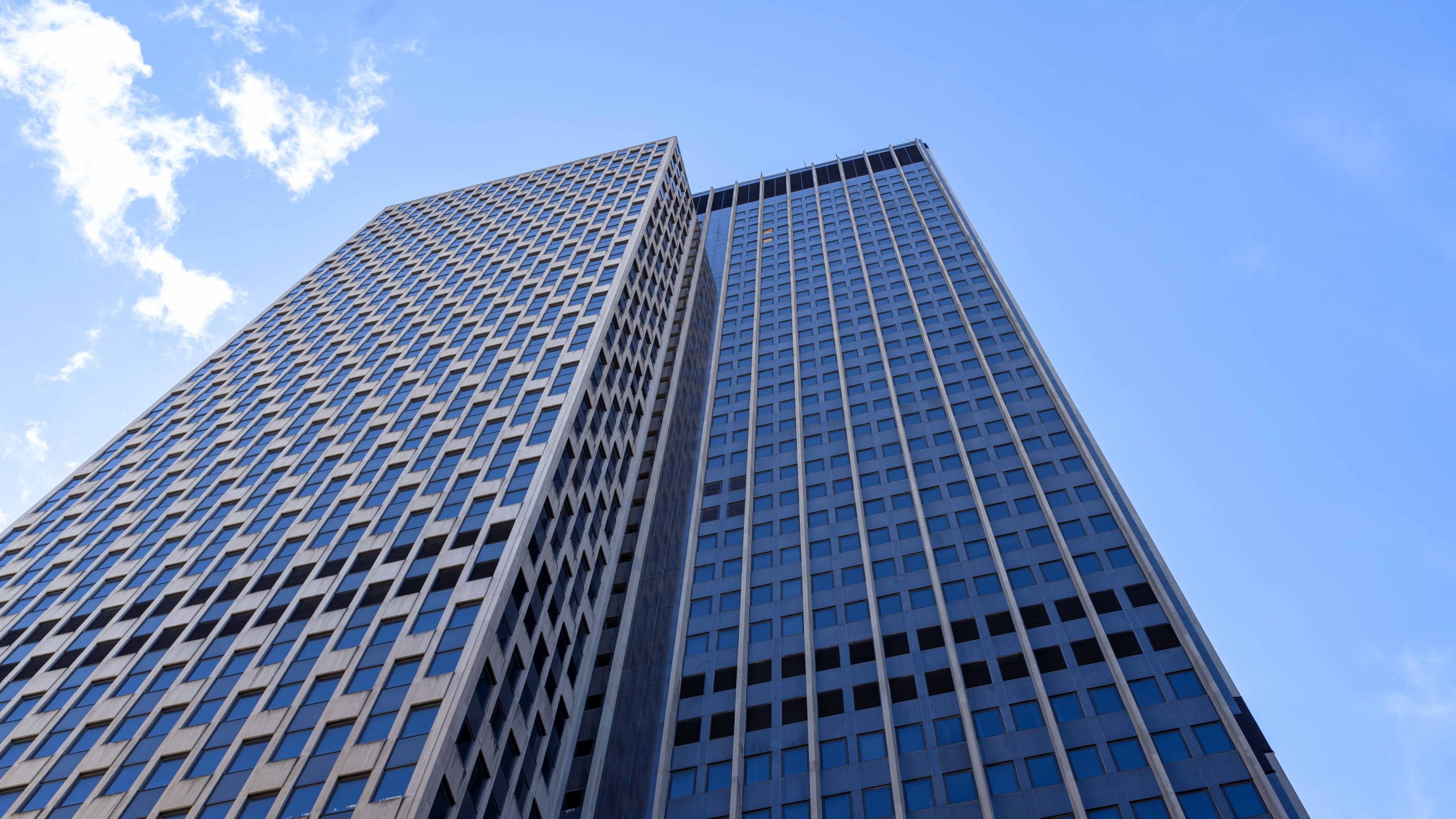Before the pandemic, West African hair braiding salons in Harlem were a one-stop shop for advice among hair braiders and clients. They were newsgathering posts and were spaces where people would stop by to sell jewelry, body lotions and snacks. Shops are spaces for camaraderie.
“I come to 125th [street in Harlem] for more than work; I come here to spend time with my friends and take the stress away. I love being among other women; we have become family. It’s the closest I get here to being in Africa,” Bintou, a hair braider from Côte D’Ivoire said.
Then, New York City reported its first COVID case a little over a year ago, and many of the city’s businesses closed. The pandemic has affected immigrants in particular, with one report showing that half of all foreign born residents have lost work. The hair braiding profession, in particular, has found it especially difficult to recover. This industry, which is overwhelmingly staffed by women from West Africa, is a lifeline that is turning into a dead end.
Customers are now starting to learn to take care of their own hair, so braiders are branching out into New York as they seek financial stability. This may represent a shift in the hair braiding industry, especially as the hair braiders who migrated to New York in the 90’s and early 2000’s are growing older. COVID-19 has forced them to come to terms with this reality and search for other ways to receive a steady income and provide for their households.
Also read: Meet the Immigrant Women on Hunger Strike for Pandemic Relief
Mariam*, from Gambia, had been braiding hair full-time in Harlem for 23 years until last March, when Governor Andrew Cuomo announced closures of hair salons, barber shops and nail salons due to COVID-19 risk factors. For Mariam, this lapse in employment was not an option, so she found a job working in maintenance with the New York City Housing Authority.
Working with NYCHA presented steady work that comes with benefits, unlike hair braiding, Mariam made the switch and only occasionally braids hair now to supplement her income. For Mariam, leaving hair braiding behind was a relief because she had finally found work in an industry that provides consistency and stability.
For West African hair braiders who do not have a safety net, Cuomo’s order to close salons was devastating. The women often lack formal education, so their skillset outside of braiding is limited. Braiding is laborious and physically taxing, and as the braiders are getting older, they cannot complete styles as quickly as they once could. However, they still work due to family obligations. They also have to follow new rules to make their businesses socially distanced.
“The hair braiders are wearing their masks, and a lot of braiders aren’t there” due to occupancy requirements that resulted due to social distancing requirements, according to Maimouna Dieye, the Program Manager of African Communities Together, an advocacy and empowerment organization based in Harlem.
“[Hair braiding] is a lot, not enough money. I’m getting older, it’s not easy… nobody wants to come now because they’re scared,” Mariam said. In the midst of the pandemic, it can be overwhelming for the braiders to seek out support services, especially because there are many obstacles and the technical phrasing can be confusing. This makes the need for a stable, pandemic-proof job even more important. In addition, the women may have underlying conditions of their own that makes coming in risky.
Also read: Immigrant Delivery Workers Organize To Fight Rampant E-Bike Theft
Although salons are allowed to open now, and they practice social distancing, the dip in business has not fully recovered. For around a month after hair salons were permitted to open back up in June 2020, there was a large boom in business, but after it started to slow down again, it never picked back up. Because many of the clients lost their own jobs, many lack the spare money to come in and get their hair done.
Styles can cost as low $70 for cornrows with extensions to around $200 for knotless box braids. However, in a pandemic it may be considered expensive and unnecessary to customers. For example, knotless braids can take over eight hours to complete and involve a particular way of adding extensions, which makes this style very time-consuming.
Although the braiders practice social distancing with one another, many customers are still afraid to come in. The clients are often also mothers, so they often have to stay home to take care of their children, who are attending classes from home. They are also learning to do their own hair via social media platforms likeYouTube and Instagram.
Also read: Undocumented Entrepreneurs: How They Started Businesses Without Papers
Aichata, a Malian braider, has been in the business for 16 years. She stopped braiding and now does home care full-time. The work is steady, which is what has drawn a number of braiders to the industry, but it pays less overall and the patients can be unpredictable.
Bintou, the Ivorian braider, finds it difficult to manage her household responsibilities with braiding. She does not anticipate hair braiding will return to the steady work it once was. “We can’t make money, we can’t even pay [rent] for our seats [in the salon],” she said. Bintou works in home care during the week and braids on the weekends.
For Bintou, who has been in the hair braiding profession for 24 years, retirement is a growing priority. COVID has further fueled her desire to find work that is more stable. This reflects the concerns shared by many hair braiders who came to the United States in the 1990’s and 2000’s and are now aging. As their children grow and become adults themselves, the women search for work that will be less physically taxing and prepare them to retire with less worry. The younger generation, who were often born in the United States, do not look at hair braiding as a job option in the same way that their mothers did, so the continuation of the West African hair braiding industry will have to depend on more recent immigrants.
Dieye believes that there are many factors that are leading to the current lack of business for hair braiders. However, she predicts that the vaccine’s eventual availability to all adults in New York State combined with people eventually returning to in-person work in the future will necessitate their customers’ desire to have their hair done once again. In the meantime, “it will be tough,” but she has faith that, long-term, the hair braiding industry will bounce back.
一文教你如何成为街头市集或夜市摊主
Also read: Chinese Truck Drivers Face Extra Barriers Finding Mental Health Care
The problem is how to survive in the meantime. African Communities Together was able to work with the Mayor’s office to distribute one-time emergency funds to undocumented people including hair braiders.
For many braiders, their profession is a way to make use of the skillset they had when they arrived in the United States. However, it is also a way for them to build a social circle. Although business is still slow and will likely remain that way for the foreseeable future, there are hair braiders who choose to stay full-time and remain optimistic. Aisha, a Guinean braider hair for 30 years, believes that “right now the business is not like before” but that “God is great, we’re gonna be okay.”
*All names in this article, aside from Maimouna’s, are pseudonyms used to protect our sources.














